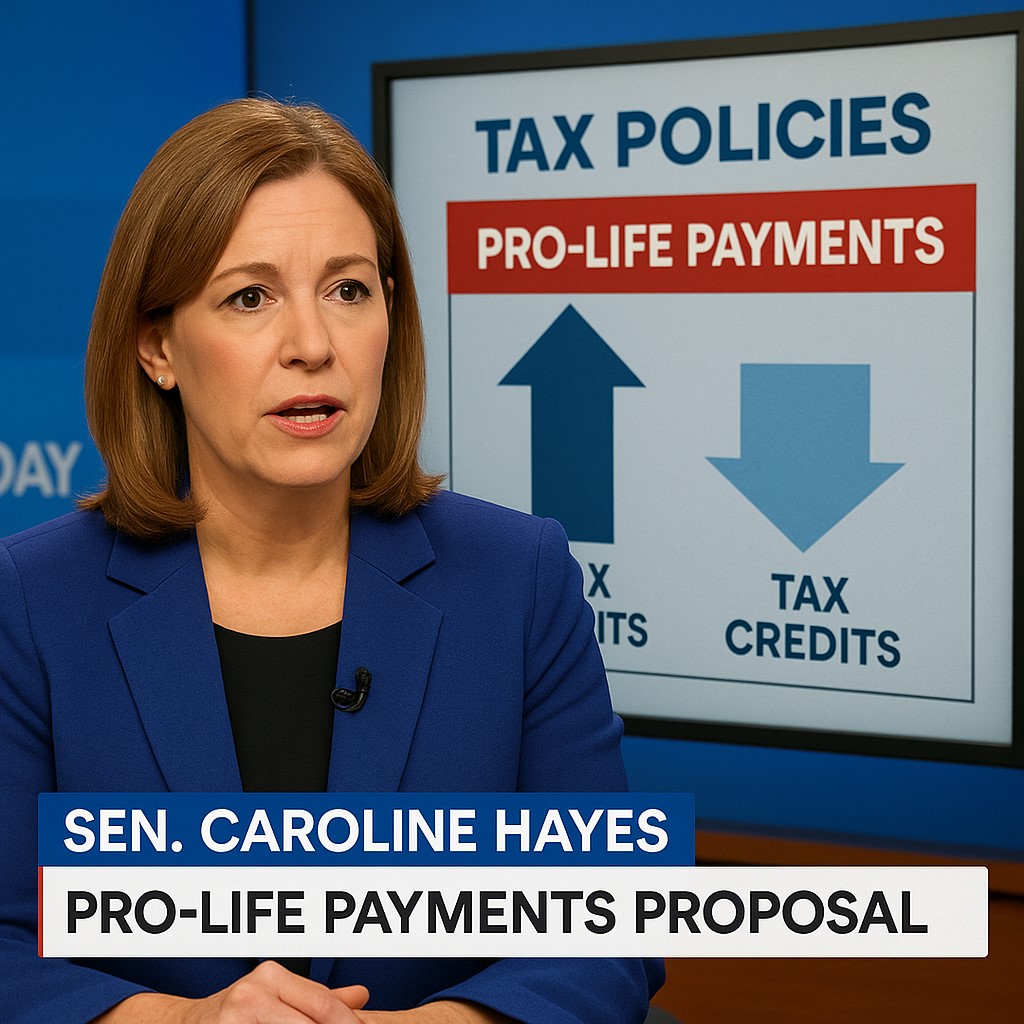Part 6: Are Democrats Pro Life? This fictional series explores what might happen if the Democratic Party became pro-life, including policy shifts, internal debates, and public reactions.
New York, NY – Appearing on Behind the Nation, Senator Caroline Hayes, a prominent Democrat, faced tough questions about the controversial Pro-Life Payments proposal, which calls for a 100% tax on abortion procedures and a 500% tax on abortion pills.
The host, armed with historical examples of Democrats using tax policy to influence behavior-such as cigarette taxes to reduce smoking and carbon taxes to curb fossil fuel use-asked whether Hayes would support this measure as part of the party’s new pro-life platform. The host began by noting the Democrats’ history of leveraging taxes to shape public behavior. “Senator Hayes,” he said, “Democrats have long championed taxes as tools for public good-reducing smoking rates and fossil fuel consumption. If your party is now pro-life, doesn’t this proposal have merit?” The question: Are Democrats Pro Life, and will they use every tool at their disposal?
Christian Merchant Card Processing
Pro Life Payments is the for-profit arm of the pro-life movement. Pro-Life Payments is reducing abortion in America by turning customer financial transactions into pro-life funding. We give 15% of gross revenue to Pro-Life organizations. Payments is transitioning donation platforms, credit card processing and peer to peer payments into a funding engine for the pro-life community. Pro-Life Payments is providing customers with the alternative to the abortion-supporting financial institutions and payment processors they are supporting today.
Taxation to Modify Citizen Behavior
Hayes responded thoughtfully but cautiously. “I appreciate the comparison,” she began. “It’s true that Democrats have historically used taxation to promote healthier behaviors and environmental sustainability. However, we must carefully consider whether punitive taxes are the right approach for such a deeply personal issue.” She continued by emphasizing that while the party’s pro-life stance is rooted in saving lives, their focus remains on providing support rather than imposing penalties. “We’re working to create systems that empower women-through expanded healthcare access, paid parental leave, and childcare subsidies-so they don’t feel forced into making these decisions in the first place,” Hayes explained.
The host pressed further, pointing out that Democrats have justified similar tax policies in the past as necessary for societal good. “But Senator,” he asked, “if your party believes abortion ends hundreds of thousands of lives every year, isn’t it consistent to use taxation as a deterrent?” Hayes surprised viewers with her candor. “It’s a fair point,” she admitted. “And I won’t deny that taxation has historically been effective in modifying behavior. But our approach is about leading constituents toward valuing life-not punishing them for their choices.” She added that Democrats are focused on creating positive incentives, such as tax credits for families or funding pregnancy resource centers.
Acknowledging Messaging Strategy
When asked whether Democrats might support such measures in the future, Hayes pivoted to acknowledge the role of messaging. “Our leadership is about shaping what our constituents value,” she said. “If they demand stronger deterrents like these taxes in the future, we’ll consider them. For now, our priority is showing voters how saving lives strengthens society.” The host then questioned whether this approach disrespects decades of pro-choice advocacy within the party. Hayes defended her position: “Leadership isn’t about clinging to past ideologies-it’s about guiding voters toward solutions that align with today’s challenges.”
Hayes’ comments sparked debate across social media and political circles. Critics accused her of sidestepping the issue and failing to commit fully to pro-life principles, while supporters praised her nuanced approach and focus on empowering women rather than penalizing them. As Democrats continue navigating their evolving stance on abortion policy, Hayes’ interview highlights the delicate balance between maintaining consistency with past Democratic values and embracing bold new strategies to align with their pro-life messaging. The question remains central: Are Democrats Pro Life?
